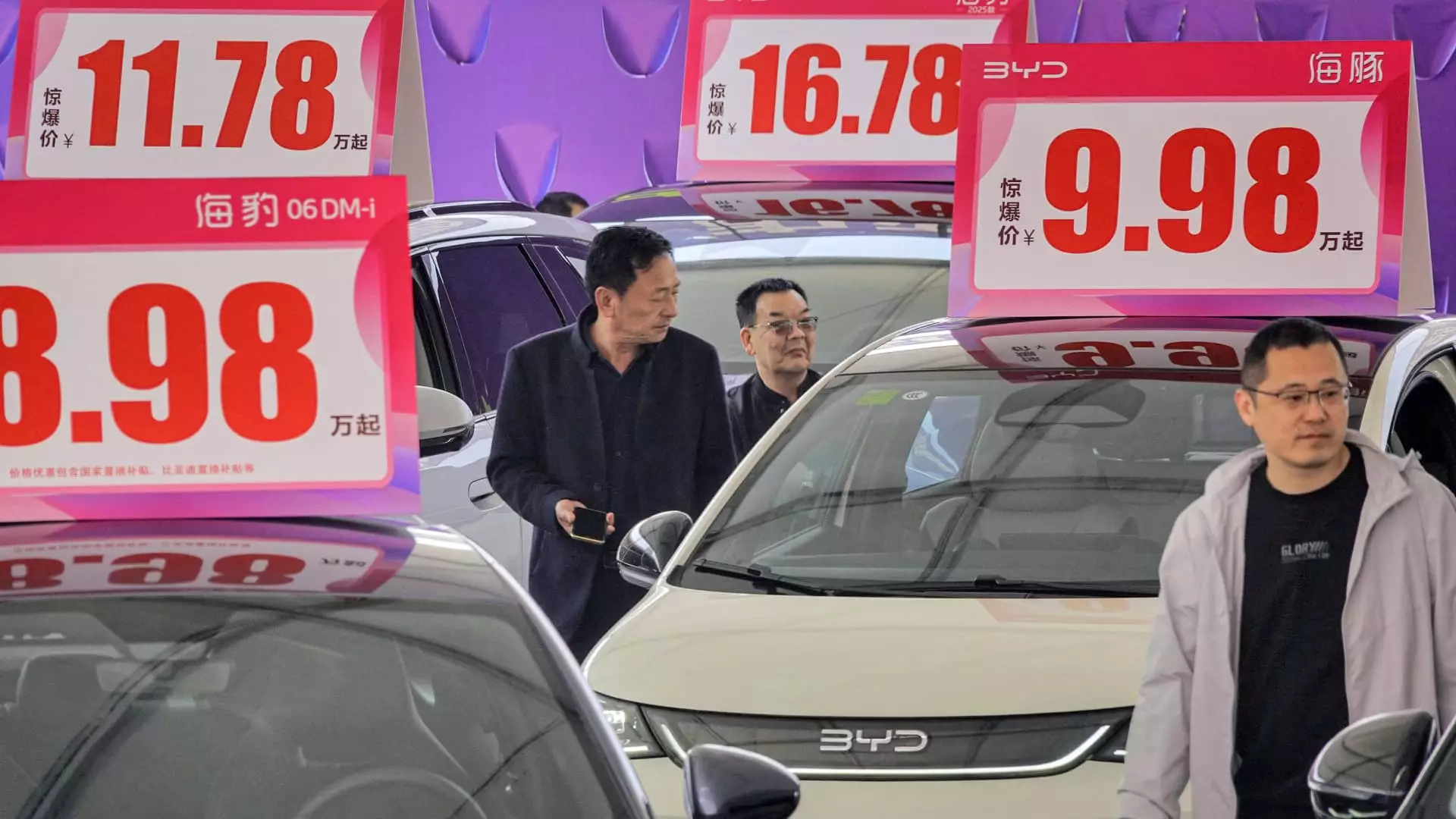In a bid to dominate the electric vehicle (EV) sector, China’s BYD has unleashed a price war that has sent shockwaves through not just the domestic economy but also the global automotive landscape. With recent discounts soaring to nearly 30% on various lower-end battery and hybrid models, the company has set the stage for a fierce competitive atmosphere. Notably, the Seagull compact car now sports a tempting price tag of just 55,800 yuan ($7,750). This drastic pricing strategy raises profound questions: Is BYD igniting a race to the bottom, or is it merely a strategic maneuver to bolster its already formidable market share?
Analysts are already sounding the alarm bells. Zhong Shi, an expert from the China Automobile Dealers Association, encapsulates the general sentiment in the industry: a sense of dread and uncertainty permeates. The situation feels precarious, particularly for smaller automakers that now find themselves at a disadvantage. The auto industry had previously been one bright spot amid China’s sluggish economic performance, but BYD’s aggressive pricing tactics are catalyzing a wave of anxiety that hints at a broader malaise within the market.
Deflationary Pressures and Supply-Demand Dynamics
The ongoing price war is symptomatic of a larger issue plaguing the Chinese economy: a significant imbalance between supply and demand. According to Morgan Stanley’s Chief China Economist, Robin Xing, the push for reduced prices is only magnifying deflationary pressures, a concern echoed in multiple reports. Rather than transitioning to a consumer-driven growth model, the auto industry’s reliance on price slashing underscores the persistence of the supply-driven ethos that has characterized Chinese markets for decades. If the industry continues down this path, real recovery could remain an elusive dream.
Moreover, the auto war extends beyond mere pricing strategies and dives deep into the very fabric of Chinese economic policies. After years of flooding the market with subsidies aimed at driving EV adoption, Beijing now must grapple with the consequences of overproduction and the impending financial instability of numerous automakers, including state-owned enterprises. It is a perilous tightrope walk that the government must navigate, lest it ignite a crisis reminiscent of the devastating Evergrande saga that shook the real estate market.
The Looming Threat of Involution
The concept of “involution” is garnering increasing attention from top Chinese officials who are aghast at the nonproductive competition that has included this reckless pricing strategy. The recognition of “involutionary” trends in business competition presents a critical moment for the auto sector. Too much focus on price reductions without improving the value proposition could lead to a scenario where consumers begin to expect lower prices as a norm, further inflating the risk of an economic collapse.
The escalating price competition has raised crucial questions regarding sustainability and profitability in the long term. The reality is that while consumers may benefit from lower prices in the short term, the companies engaged in such relentless discounting are sabotaging their financial futures. Companies like BYD may appear to be winning for now, boasting handsome profits and market dominance; however, the increasing focus on the bottom line threatens to stifle innovation and quality.
Global Repercussions: Tariffs and Market Entry Challenges
As China’s electric vehicle market becomes an epicenter of aggressive pricing, the reverberations are being felt globally. The European Union has imposed tariffs on imports of China-made EVs, questioning the feasibility of market expansion for companies like BYD. Similarly, the U.S. has enacted hefty duties, raising challenges for firms aiming to penetrate one of the largest automotive markets in the world. These international constraints serve to underscore the fragile equilibrium that the electric car industry faces on a global scale.
The irony lies in how, despite these barriers, BYD is thriving. The company recently outperformed Tesla in European sales, a significant milestone that underscores its aggressive strategy. However, with Tesla’s shrinkage in Europe, raising pertinent questions: Is this a sign of sustainable growth for BYD, or merely a fleeting moment in time? As BYD and its competitors venture into the global market, they must not only contend with external opposition but also drastically rethink their strategies to avoid self-inflicted wounds.
What’s Next for Automakers in China?
As we look to the future, the question that looms large is how Chinese automakers will adapt to this rapidly evolving landscape. If the current trend continues, we may witness a bifurcation in the market, where established names struggle to retain their foothold while startups, offered by consumers rapid-fire funding and supporting policies, rise or fall based on their adaptability. Innovation focused on quality should rise to the forefront as automakers grapple with their identities in a market laden with both opportunity and peril.
China’s electric vehicle war is a double-edged sword. On one side, it ingrains an urgent sense of competition that drives prices down and increases accessibility. However, on the flip side, both the economic health of the auto industry and the well-being of individual companies may be compromised as they chase ever-decreasing prices to stay afloat in a turbulent environment. As we stand witness to this unfolding drama, one can only hope that reason prevails, guiding the industry towards sustainable practices that prioritize quality over shortsighted gain.

